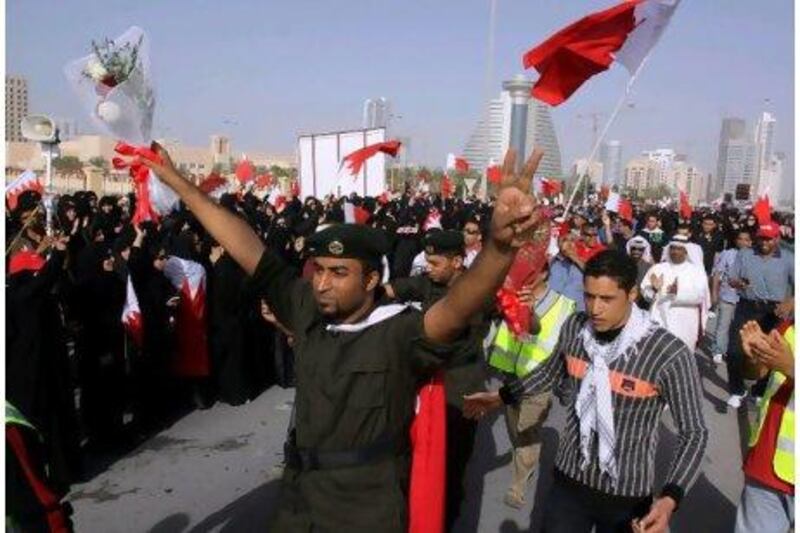MANAMA // A sea of people demanding reform of Bahrain's political system and justice for seven protesters killed in the past week poured onto the streets of the capital yesterday.
Estimates place the number of opposition protesters in the tens of thousands, making it the largest anti-government rally in the weeklong unrest.
Hassan Mushaima, the leader of Haq, a hardline Shiite movement, had been scheduled to arrive from the UK to join yesterday's protests. But, after travelling from London, where he has lived in exile, to Doha, he then flew on to Beirut, according to a Haq member who had gone to meet him at the airport in Bahrain.
"We now expect him to come tomorrow to Bahrain," Mohsen al Moqdad said last night. It was not immediately clear what caused Mr Mushaima to delay his return to the country. He had faced possible arrest, but authorities announced on Monday that they would release a group of political prisoners, including Haq activists, who were accused of plotting against the state.
Yesterday's march, organised by groups including the main opposition movement, Al Wefaq, began about 3pm, when hundreds took to a central highway leading towards Pearl Square, the focal point of the protests. Zeina Mohsen, an 18-year-old banking student from Manama, joined the throngs.
"We want a new system because we are not given a chance to work," she said, referring to what some Shiites describe as widespread discrimination. "When I leave university, I don't think I will find a job because we don't have equality."
Some, such as Ali Mohammed, 39, who works in the private sector, have simply not shown up at their jobs since Thursday, when tensions escalated after a raid on sleeping protesters at Pearl roundabout that left four dead.
Others, such as Majeda Mohammed, 34, from the village of Deih, came to the march yesterday directly from their jobs.
"I have a responsibility to be there at work, so I went, finished and came here," she said. "But, after they killed young people, no one can stand such a situation. But we have to remain united. This is the only way forward."
As the stream of people moved towards the roundabout, Mohammed Ibrahim, 25, from Muharraq, said he rejected the idea that the country would be divided by the events of the past week.
"For me as a Shia, I don't feel any difference between Shia and Sunni," he said. "I believe the crown prince has a plan for the future. I don't want to remove the royal family, but the prime minister should be elected by the people."
As Mr Ibrahim spoke, cheers went up as one soldier and seven policemen, some in uniform, were shuttled through the crowd by a group carrying flowers. During the past week the police and the armed forces have been accused of using excessive force against peaceful protesters.
The eight, the soldier and the policemen, came with a message of solidarity, taking to the stage at the centre of the square and announcing that they were on strike after the bloodshed. Among the group was Shaker Butaqi, a 32-year-old policeman, whose brother, Mahmoud, was among those killed last week.
"I am feeling very happy to wear my uniform here today because my uniform is meant to protect the people," he said. "I can't believe when the army and the police were shooting the people. But we will not quit. The [defence] minister should quit."
Earlier yesterday at a media briefing, Maysoon Sabkar, a government spokeswoman, said a government investigation into the injuries and loss of life had been launched.
"The government is deeply saddened by the tragic events of the past few days and its condolences go out to those families who have lost loved ones," she said in a statement.
Sheikh Salman bin Hamad al Khalifa, the crown prince, was said to be consulting with various groups on a path to a "national dialogue", although no time frame had been set yet for talks with the opposition, which is still formulating its position.
"The crown prince's priority is to ensure the participation of all political groups so that everyone can get around the table and begin the national dialogue in earnest," Ms Sabkar said.
"His Royal Highness continues to call for all Bahrainis to engage in this new process, to move away from polarisation and ensure that sectarianism does not take root in Bahrain."
On Monday night, tens of thousands of people rallied in support of the royal family at the Al Fateh Grand Mosque, while thousands more remained camped out at Pearl Square demanding change. Some are asking for constitutional reforms, but there are those among the protesters who have occupied the large traffic circle since Friday who say they want to remove the Al Khalifa family.
Muneera Fakhro, a prominent female politician and member of the liberal Waad party, said the rhetoric on both extremes of the political spectrum needed to be toned down.
"There is upheaval, but in general there is a peaceful movement which I think is about civil rights," she said yesterday. "We have to leave the tension, because people have been lost and the problem now is that they don't trust the system. Now the crown prince is asking for trust. There is no other way but to trust him. I say go to the table and I am encouraging dialogue."





